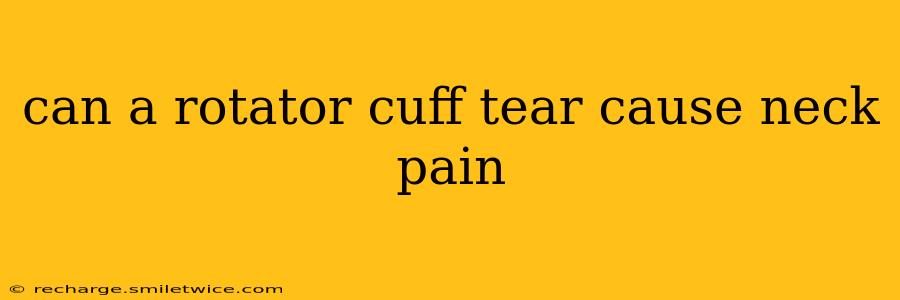A rotator cuff tear, a common shoulder injury, can indeed sometimes cause neck pain, although it's not a direct, immediate cause-and-effect relationship. The connection is more nuanced and often involves compensatory mechanisms and referred pain. Let's explore this complex relationship.
How Rotator Cuff Tears Might Lead to Neck Pain
While the rotator cuff muscles are located in the shoulder, their dysfunction can trigger a cascade of events impacting the neck. Here's how:
-
Postural Changes: A painful shoulder from a rotator cuff tear often leads to postural changes. To avoid aggravating the shoulder, individuals might unconsciously hunch their shoulders, tilt their head, or adopt other compensatory postures. These postures strain the neck muscles, leading to pain and stiffness.
-
Muscle Imbalances: When the rotator cuff is injured, the surrounding muscles compensate for the weakened or damaged muscles. This can create imbalances throughout the upper body, affecting the neck muscles and leading to pain. The trapezius muscles, which connect the neck and shoulders, are particularly susceptible.
-
Referred Pain: Although less common, referred pain from a rotator cuff tear can sometimes manifest in the neck. Referred pain is pain felt in a location different from the source. The complex nerve pathways in the upper body can sometimes cause pain signals originating in the shoulder to be perceived in the neck.
-
Muscle Spasms: The body's response to injury often involves muscle spasms. A severe rotator cuff tear can trigger spasms in the neck muscles as the body tries to stabilize the affected area.
-
Associated Conditions: Conditions that often accompany rotator cuff tears, such as bursitis or tendinitis, can also cause referred pain or contribute to neck pain.
How to Tell If Neck Pain is Related to a Rotator Cuff Tear
Distinguishing between neck pain originating from the neck itself and neck pain stemming from a rotator cuff problem can be tricky. However, some clues might help:
- Shoulder Pain: The presence of significant shoulder pain, especially pain with movement or lifting, strongly suggests a rotator cuff issue.
- Pain with Shoulder Movement: Pain that worsens when you reach overhead, lift objects, or rotate your arm indicates a potential rotator cuff problem.
- Weakness in Shoulder: Noticeable weakness in your shoulder, making it difficult to lift objects or perform simple movements, is another key indicator.
- Timing: Did the neck pain start around the same time as your shoulder pain, or did it develop later? A simultaneous onset suggests a potential connection.
Other Causes of Neck Pain
It's crucial to remember that neck pain can stem from numerous other sources, unrelated to a rotator cuff tear. These include:
- Cervical Spondylosis: Degenerative changes in the neck vertebrae.
- Whiplash: A sudden neck injury.
- Muscle Strains: Overuse or injury to neck muscles.
- Pinched Nerve: Compression of a nerve in the neck.
What to Do if You Have Neck Pain and Suspect a Rotator Cuff Tear
If you experience neck pain accompanied by shoulder pain, weakness, or limited range of motion in your shoulder, it's essential to consult a healthcare professional. A doctor can accurately diagnose the cause of your pain and recommend appropriate treatment. Self-treating can delay proper care and potentially worsen your condition.
Can a Rotator Cuff Tear Cause Neck Pain on the Opposite Side?
While less frequent, it's possible to experience neck pain on the opposite side of a rotator cuff tear. This is due to the body's compensatory mechanisms and the interconnected nature of the musculoskeletal system. The body may attempt to stabilize the injured shoulder by engaging muscles on the opposite side, leading to strain and pain in the opposing neck.
How is Neck Pain from a Rotator Cuff Tear Treated?
Treatment for neck pain related to a rotator cuff tear usually focuses on addressing both the shoulder and neck issues. This might include:
- Physical Therapy: To improve shoulder and neck mobility, strengthen supporting muscles, and improve posture.
- Medication: Pain relievers or anti-inflammatory drugs to manage pain and inflammation.
- Injections: Corticosteroid injections into the shoulder to reduce inflammation.
- Surgery: In cases of severe rotator cuff tears, surgery may be necessary.
Remember, this information is for educational purposes and does not constitute medical advice. Always consult with a qualified healthcare professional for diagnosis and treatment.
